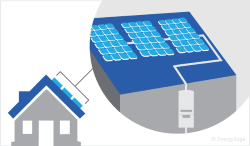Thanks to advancements in digital technologies, string inverters are also being used as diagnostic devices to check the performance of solar panels

For their role in making the solar power usable, the inverters are generally considered to be the brains of solar installations. Going a few steps ahead, the string inverters are fast expanding their role into monitoring and diagnosing solar panel systems to enable observation and management (O&M) crews to identify and fix issues fast.
"You can now monitor the performance of your solar panel system with ease while sitting at your desk," says Shantanu Sirsath, Technical Head, India, Growatt who bets big on the use of advanced digital technologies such as Artificial Intelligence (AI) in the solar energy industry. “With increasing availability of indigenous electric components, convenient losses have reduced. Inverter makers are incorporating AI to pinpoint the issues and cut down energy losses. The overall time for maintenance has reduced helping the concerned team.”
Srisath was speaking along with other experts at the webinar "String Inverters: The Smart Solution for Rooftop Solar Systems” hosted by Mercom Global on May 31, 2021. The virtual event was moderated by Priya Sanjay, Managing Director, Mercom India.
Sirsath, whose company entered Indian market nine years back, claims to be the only string inverters manufacturer in India. “65% of our inverters are being used indigenously. We have sold 1,16,000 units in Indian market and demand will grow. We have a full fledged team of 15 service engineers to provide care across India. While we established our first engineering service centre in Hyderabad for spare parts in 2016, recently in 2020, we have established one more in Ahmedabad. In terms of R&D to make the product better, we have replaced the aluminum material with a polycarbonate silicon body, thus helping in weight reduction by 20% besides easy installation.”
“Multiple strings from solar panels carry DC power to the string inverter where it’s converted into usable AC power consumed as electricity. Depending on the size of the installation, one may have several string inverters each receiving DC power from a few strings, explains Rakesh BP, Technical Sales Manager Solis who points out that since string inverters are connected by series, it is very helpful in the techno commercial aspect. “These are application oriented and will try to catch the thermal losses and help in reducing maintenance time and thermal dehydration as compared to conventional ones.”
Innovation to drive consumer choice
Before choosing a string inverter one must look at the manufacturers’ R&D investments, advises Sudhir Pathak, Head of Design & Engineering, Hero Future Energies. “R&D driven products stay longer. As an example, if we need to replace the models damaged by winds, we must be able to find a replacement that matches in adaptability. With growing awareness, there will be demanding customers. Since manually it won’t be possible to climb and check the solar panels every time, drones with thermal imaging cameras will fly automatically to a particular location. The drone will then take images and send it to the system which will then command a second drone with water to go and spill water for cooling.”
Comparing the origins of string inverters and their availability, Bhaskar Kamath, Head, Rooftop Engineering, Tata Solar Power mentions, “Most of the brands earlier were made by German companies but now Chinese have gained more presence. However, the latter are clones of each other mostly with little difference. Therefore, what matters is financial track record, long-term plans, R&D and service of the company. For many, cost is not a factor but the brand consciousness certainly is. German brands are very old and they have done remarkably well."
Calling reliability an important criteria, Kamath raises issues such as lack of feedback on manufacturers on failure of inverters whenever that occurs. He stresses on the need to have the solutions that fit Indian conditions.
Niranjan N Naik, Consultant, Bosch Energy and Building Solutions opines that price consciousness of customers in India leads to inverters with less focus on quality. “I would like to lay focus on the safety aspect. Pricing and value proposition in the overall cost system plays a role. While choosing a product, past performance of players matters a lot. However, the solar panel inverters have witnessed a lot of change. While Chinese products have made the relationship transactional, I have seen companies asking specifically for European brands. Also, AI based smart inverters appear to be the way forward for this segment.”
Subscribe to our newsletter & stay updated.